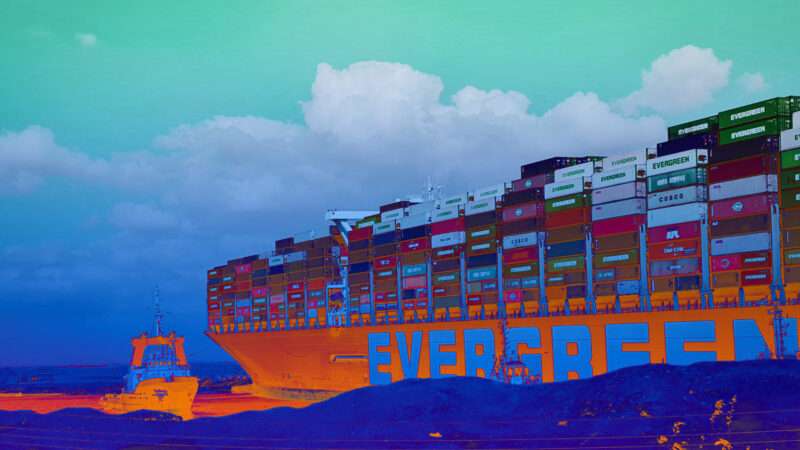
Now that the Ever Given has been freed from the sandy banks of the Suez Canal, we can safely return to ignoring the modern miracle of global trade that tends to be noticed only on the rare occasion when it doesn’t work as smoothly as we’re accustomed.
Before that happens, let’s take a moment to appreciate it.
An estimated $9 billion worth of trade flows through the Suez Canal every day, according to Lloyd’s List, a London-based shipping journal—an amount considerably larger than the entire annual economic output of dozens of countries. All of it is the result of individuals and businesses engaged in mutually beneficial transactions despite being separated by thousands of miles. Each and every item shipped through the canal is evidence that trade grows the world’s economic pie—simply because you can sell more goods when you have access to more customers, whose standards of living are raised by having access to more goods.
The Ever Given running aground was (presumably) an accident. Unfortunately, other disruptions to the global trading system are deliberate acts of sabotage carried out by political leaders who don’t cheer for a giant ship being stuck in the Egyptian mud, even though the effect is exactly what they are trying to accomplish in other, less obvious ways.
But whether it’s a big boat unexpectedly stuck in the middle of the Suez Canal or billions of dollars of tariffs imposed with little advance warning, surprising disruptions to the flow of global trade generally have the same two consequences. First, they make trade more expensive (and therefore reduce the economic benefits that it bestows). Second, trade keeps on happening anyway.
That’s exactly what would have happened if the Ever Given hadn’t been quickly dislodged. With more than 300 ships stuck behind the Ever Given, some were already making plans to do the really old-fashioned thing and sail around the tip of Africa. That would have added 6,000 miles and several weeks to the journey from the Indian Ocean to the Atlantic Ocean. The added fuel costs would raise shipping prices by as much as $300,000 for some ships, Bloomberg reported.
In short: Trade wouldn’t stop. It would just become more expensive.
Hey, that might sounds familiar. When the U.S. and China raised tariffs against one another in 2018—tariffs that are still in place—it caused similarly weird disruptions in the flow of goods. China effectively cut off purchases of American-grown soybeans, for example, so the soybean trade rerouted itself. South American soybeans suddenly started flowing into China, and American soybeans were exported to Brazil in larger quantities. Trade didn’t stop, it just found new routes.
Meanwhile, U.S. tariffs on goods imported from China have spurred some companies to route their purchases through Canada to avoid the higher costs. Others are just stuck paying higher prices. In some cases, the tariffs have contributed to shortages of important items. If there was a massive ship blocking access to all U.S. ports, the results would be pretty much the same.
The big difference is that when a boat gets stuck in the Suez Canal, it’s a major crisis that gets fixed as quickly as possible so trade can continue flowing unimpeded. When tariffs cause the same sorts of disruptions, however, America’s political class is increasingly in agreement that there is no crisis at all.
Commerce Secretary Gina Raimondo says the Trump administration’s tariff policies have been “effective.” Biden’s trade representative, Katherine Tai, told Congress during her confirmation hearing that tariffs are “a legitimate tool” and that she hopes to “accomplish similar goals” as the Trump administration did on the trade front.
But if former President Donald Trump had deliberately crashed a ship into the Suez Canal, and Biden’s advisers were standing around saying they had no immediate plans to remove the ship and, in fact, maybe the right thing to do is smash more ships into more canals around the world…that would rightly be recognized as policy insanity.
Why is it any different now?
from Latest – Reason.com https://ift.tt/2PL4TQX
via IFTTT